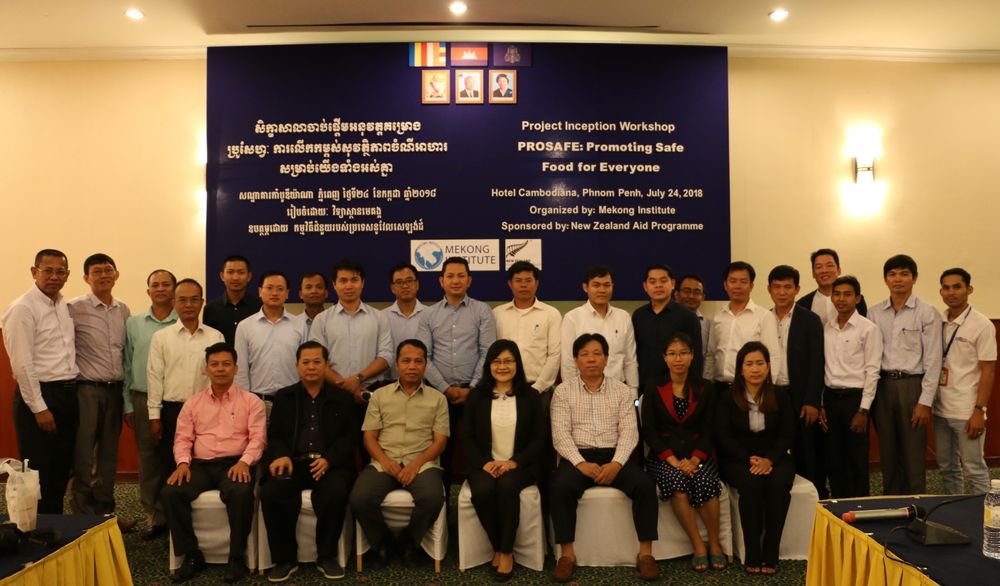As Mekong Institute’s PROSAFE Project goes full blast with new training courses, the first in a series of Country Inception Workshops was held yesterday, July 24, in Phnom Penh, Cambodia. The workshop gathered 27 participants from four key ministries (Ministry of Agriculture, Forestry and Fisheries [MAFF], Ministry of Industry and Handicraft [MIH], Ministry of Commerce [MoC] and Ministry of Health [MoH]), academic and research institutions, as well as private sector representatives who have been involved in the implementation of the first phase of the MI-Food Safety Project in the country.
Similar workshops are scheduled to take place in the other countries covered by the project, including Lao PDR, Myanmar and Vietnam. The one-day workshop aims to present the challenges and issues in food safety in the respective countries, and finalize country action plans to further strengthen food safety consciousness and behavior for the next five years of the PROSAFE Project.
Delivering the welcome remarks, Mr. Dim Theng, Deputy Director General of Cambodia Import-Export Inspection and Fraud Repression Directorate General (Camcontrol) and the Project’s focal point for Cambodia, warmly welcomed the participants and thanked them for their participation.
“Food safety is a complicated issue and the responsibilities lie with various actors in food supply chain from production to consumption stages,” he remarked. He also added that the private sector particularly food processors and handlers are key actors in the food supply chain. To ensure the safety and quality of food, it is crucial for them to have appropriate knowledge and expertise in the application of modern agricultural practices, food hygiene, and good food handling practices.
“The government is working hard to prepare the necessary regulations and standards to ensure food products are safe,” he explained. “This inception workshop is a perfect platform for the government and the private sector to discuss the country priority needs in promoting food safety in Cambodia. It is a good opportunity to share our views and identify the key challenges faced and propose action plans to address those issues via PROSAFE post-training outreach activities,” he said.
Ms. Maria Theresa S. Medialdia, Director of MI’s Agricultural Development and Commercialization Department likewise added that the workshop is an occasion to also formally launch the PROSAFE Project in the country and plan ways forward. “This inception workshop is important because we would like to understand better how stakeholders in Cambodia, the change agents like you, plan to promote food safety in your country.”
She also explained that the first phase of the Food Safety Project has achieved quite remarkable accomplishments, but also not without challenges since the four countries have similar but also different issues in food safety.
“Each country had a different stage of understanding food safety, and we would like to customize our activities according to the needs of the country. That is why we are here. We would like to listen, get your opinion on how to move forward. We would like to make our work more meaningful, more interesting and something that will be appreciated by the stakeholders in the country,” she explained.
The PROSAFE Project is the second phase of the MI-Food Safety Project supported by the New Zealand Aid Programme (NZAP). The project seeks to strengthen technical support and scale-up regional and local capacity building initiatives to further promote food safety in CLMV. In the next five years, the project hopes to further engage key actors from both the public and private sectors and put in place an integrated mechanism leading toward significant changes in food safety perception and practices in the region.








